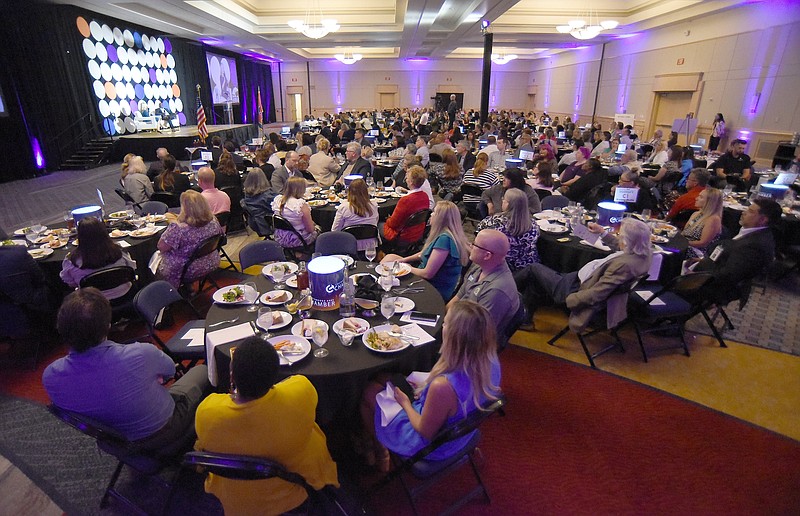I hesitated going into the banquet room at the Chattanooga Convention Center for the 2023 Diversify Summit hosted by the Chattanooga Area Chamber of Commerce and BlueCross BlueShield of Tennessee. The last time I attended this conference was before the pandemic when I delivered an inclusive invocation. My friend and colleague, Ron Harris of BlueCross, demonstrated unconscious bias by asking us if we thought he could slam dunk a basketball. We all laughed since Ron is definitely "vertically challenged." Our biases were immediately visible.
Unfortunately, Diversity, Equity and Inclusion (DEI) biases have exploded into national controversies with actions like Texas Gov. Greg Abbott banning diversity offices on all state-funded college campuses. I wondered if the toxic national conversation about the topic would keep people away from learning more about the issue.
It was gratifying to see the banquet room packed with people chatting away as old friends and new colleagues traded notes with each other. Seeing familiar faces was both a post-pandemic shock and a joy. The joy was magnified as the program got underway. Dedication, interest and passion were clearly not suppressed by anti-DEI sentiments growing elsewhere in the country.
As the Times Free Press reported, a question that resonated throughout the room was, "What role do each of us play in cultivating a diverse workforce?"
April Lomax, BlueCross's director of corporate workforce diversity, spoke about how their board set DEI goals with accountability to ensure meaningful, measurable progress. That includes the diversity supply chain where the insurer has spent $95 million with diverse businesses. Lomax then set the stage for keynote speaker Jennifer Stanley, partner at McKinsey & Company, to share diversity metrics and the implications for future action by everyone in the room.
As Stanley discussed data measuring DEI progress, one of the phenomena she raised was the concept of the "broken rung." That refers to the trend of women, especially women of color, who advance to the first level of management on their career path but are unable to reach the next rung on the ladder. Stanley noted to help women move up the ladder, they need both mentors and sponsors, which serve two distinct roles.
The difference between the two resonated with attendees, including Dr. Ben Wygal, assistant to the president at Southern Adventist University, and UTC professor emeritus Deborah Arfken, who said, "The terms mentoring and sponsorship are often used interchangeably in work environments, but in practice they are very different. As Jennifer pointed out, mentoring is more about personal nurturing, while sponsorship involves advocacy for someone's career advancement."
It is easy to see why women struggle to advance: unconscious bias in the workplace combined with too few workplace sponsors means the "broken rung" is almost inevitable. Biases are often held by the people in power, often white men who tend to sponsor other white men. To demonstrate, Stanley shared a personal story about her being the only woman in an executive meeting. She was immediately asked by several men to take their orders for lunch.
I hope that stories like this will soon be in the dust heap of history, but there remains plenty of biases that need our awareness and collective effort to minimize and eliminate.
As WTCI President/CEO Bob Culkeen commented, "Diversify 2023 invited the community to come together to discuss important DEI issues that encompass our community. The dialogue that was part of the workshop and enhanced in the luncheon reminded the group that we all can make a difference. The phrase 'it takes a village' was echoed throughout the event, yet more importantly, it all starts with the courage and support of an individual."
Contact Deborah Levine, an author, trainer/coach and editor of the American Diversity Report, at deborah@diversityreport.com.
